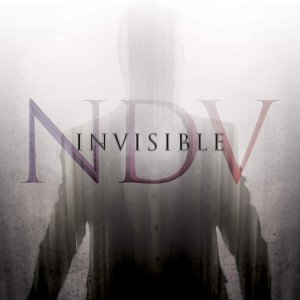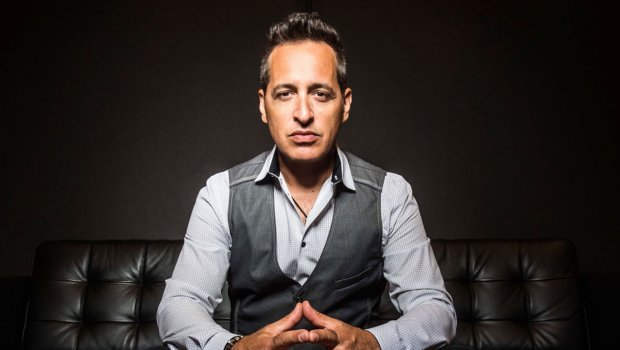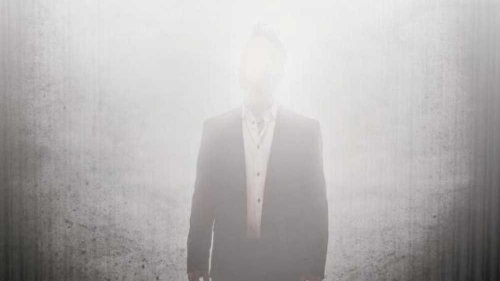With his second solo album, Invisible, released earlier this year, TPA’s Tony Colvill talks to Nick D’Virgilio, drummer, singer, and multi-instrumentalist extraordinaire with Spock’s Beard, Genesis (briefly), Big Big Train, and many more…
Nick, having released a solo album, Karma, whilst with Spock’s Beard in 2000, why so long until the release of Invisible?
 It just took this long to get to this point, when I did that first record, I should say I was heavily involved in other bands and stuff. I had Spock’s Beard stuff going on, I was still doing Tears For Fears gigs, plus other stuff on the side, and family and normal day to day things. So, the solo artist thing really didn’t take hold for me because of the way my career was going, and looking back my song writing wasn’t as strong as it is now. When I started to sing lead in Spock’s around that time, we were required to write more for the band since Neal [Morse] had left, so that helped my song writing chops as well. It just took this long to get here, when I had the time, the confidence, and I just made it a priority.
It just took this long to get to this point, when I did that first record, I should say I was heavily involved in other bands and stuff. I had Spock’s Beard stuff going on, I was still doing Tears For Fears gigs, plus other stuff on the side, and family and normal day to day things. So, the solo artist thing really didn’t take hold for me because of the way my career was going, and looking back my song writing wasn’t as strong as it is now. When I started to sing lead in Spock’s around that time, we were required to write more for the band since Neal [Morse] had left, so that helped my song writing chops as well. It just took this long to get here, when I had the time, the confidence, and I just made it a priority.
Confidence is the key to the concept of your album, when people have the confidence to try other things and say to themselves, “I don’t want to do this all my life”?
Yeah, so many people get stuck in a rut and they don’t feel that their life is worth anything or they’re bored, or they just don’t have purpose. I think we all have purpose, whatever that is, big, small or in the middle, that was my overriding moral for the story. We’re all here for something and that’s where I was going with it all.
I quite agree, I personally would actively see it as helping people to develop. It’s a story of societies forgotten souls, the cogs and wheels who hold it together with the credit often going to the bigger cogs. Don’t take this the wrong way, but is the drummer’s role in a band that of a cog?
Well, I guess, could be.
[Like the casting of seed this question I felt was one of the seed on stony ground, win some, lose some. Nick’s answer I felt was quite magnanimous. Then like the child in the sand as the tide came in, I kept digging…]
Was the observation from a personal perspective, i.e., you the drummer or broader projection on society as a whole?
Definitely society as a whole, not me specially, though I did draw upon my own life experiences and where I built upon it. The ups and downs of the music industry, that’s for sure. So, there is a little of me in there, though I tried to work it as an open concept, everyman sort of story.
You open the album with Prelude, which is a beautiful piece, but the only track that doesn’t have you as its driving force. How much were you involved in its composition?
Not the Prelude, what happened with that was the gentleman who wrote that is call Carl Baldasarre, and I’ve been working with him at Sweetwater. He has a great story, he’s about 60 now, he was in bands in his early 20s and late teens, not making money, so put music on the shelf and became a banker, hugely successful and wealthy in that world, but always wanted to do his music. So, he sold all his companies and he’s living his musical dreams, and can afford it, which is really cool. We’ve recorded 72 of his songs, and he is putting out a prog record, a classic rock record, but he’s really good at writing classical music. He understands all the different instruments and their ranges. So we became friends and he’s been around for the recording of my record, and he came up with that piece sort of on his own, then we morphed it a little bit to ‘kinder’; he took a lot of the themes and changed the rhythmic qualities and turned it into that. He offered it up, and I just thought it was a cool way for the record to start out.
Yeah, I thought it was very cool. Moving from the Prelude into Invisible, which I took to be a synopsis of what we would be hearing.
Yeah, it’s an overview of the whole thing.
An explanation of your protagonists’ character? You didn’t give the character a name?
No, it could be anyone, doesn’t have to be a man, so yes, I did that on purpose.
Musically, the album covers a wide range of styles, was there any particular style you left out, and if so, why?
You know, the songs just came out the way they did. I got my inspiration from all kinds of different areas. It’s all based on my Rock background really; I’m a student of that style, and progressive rock obviously, I wasn’t focused on this song has to be this, or that song needs to be that, it was just sort of where the songs drew themselves.
You know, I listen to all kinds of stuff, so the third or fourth track is where it’s gone, it’s an R’n’B, quasi-Bee Gees sort of thing; that’s how I go kind of inspired. I was imaging him walking down the street at that sort of tempo, taking in the sights and sounds, a fresh view of these things outside, I thought of Saturday Night Fever and that sort of stuff, that was my jumping off point of where the song was going to go. I wanted this happy feeling track.
I can say that about all the other songs. Wherever they led me to go, I let them go naturally, or as naturally as possible I should say.
It doesn’t seem contrived and seems to flow quite organically.
That’s cools, I appreciate that. I tried. I tried to make it flow as much as possible. [Chuckles]
What I did notice, and I guess that it stems from your time with Cirque du Soleil, is the music structure is similar to showtunes, and that your vocal delivery is quite narrative, in story teller mode. Was it much of an influence, or just a reflection of how you write?
A little bit of both, I learned a lot from that gig, things like how to build stuff, and coupled with working with some great artistes over my career, from Neil Morse, Kevin Gilbert, Roland Orzabal, and Mike Keneally, really gave me a great education in how to build these tracks, and put the emotion in, so they kinda stem from a little bit of everything.
Looking at the album overall, it doesn’t seem like it would be a far step into taking it in to a stage show.
You bet.
Is it something you would consider?
It’s in the planning stage, I don’t know how at the moment with all the crap that’s going on these days, so it might have to be awhile, but definitely got to play this live and try and perform it. Then beyond that and turning it to something other people would perform, that would be cool too. There’s been a little bit of talk of that, but definitely something I want to take out and perform for sure.
Where does that philosophy regarding people’s potential stem from?
Gosh, I don’t know, I guess how I grew up and stuff my parents taught me, people than mentored me growing up. Gosh, I think everyone has some potential, it’s what I learned as a person, I think that it is all those different influences.
It’s about finding the reason for it all, what makes you you. It could be the smallest thing that changes you or someone, an unexpected meal or gift, something that starts you thinking differently.
Creating the options and choices open to somebody?
Yes.
Great voice, quite show/rock theatre; is it just how you sing naturally, and do you ever have the urge to try different styles?
I think I feel naturally comfortable that way, but I’m always trying to learn and do different things; and sing if I can’t manipulate my voice, my drums whatever. Even to this day, I practice and try to improve on it. I’m open to anything musically, totally.
Where do you start with writing a song? The melody or the rhythm?
Gosh, there is no one way, a lot of those songs started from guitar riffs, some started with piano chord progressions, rarely do they start from melody specific stuff. Sometimes I’ll sing words over the riff or chord progression.
The drums are considered a workhorse of music, so it is nice to see you bring it to its full musical potential. Do you have a favourite from the album?
It varies from week to week. I like the way the song Mercy turned out quite a bit. The main song, Where’s the Passion?, a lot of people like the cover song Money, and the cinematic feel it has. I really dig that. But it sort of varies. I really like the way the ballad, Waiting for No One turned out. Carl Verheyen’s guitar solo totally lifted that song to a different place, for me. It varies.
My expectation, rightly or wrongly, was something closer to the piece you wrote for Big Big Train on Grand Tour, but there is nothing like that, you don’t appear encumbered by genre.
That’s the greatest thing about music, there is so much out there, to learn from, and melding things together is an awful lot of fun. I try to keep an open mind and canvas to whatever comes along. Learn what I can and try my best. Sometimes it works, sometimes it doesn’t.
With a third album, will we see an even broader canvas?
Maybe, I don’t really know, the sky’s the limit, I’m writing a ton more. I got plans to put out a lot more solo music over the next ten years or so, along with Big Big Train and those kind of things.
You’re still young Nick!
I think I’ve got a little bit of time left, that’s for sure. I want to take advantage of it now, since it has taken this long to get here. We’ll wait and see.
How has the down time affected you?
Busy, doing interviews like this, making sure the Is are dotted and the Ts crossed, there’s a lot of coordination that goes with this stuff, but I’m blessed with some very good friends working a lot from home. It seems that lots of people have taken the down time to pick up an instrument and learn, so Sweetwater Music, the company I work for, has kept me busy as well.
But lots of ideas for future projects and songs.
I liked working from home quite a bit, you just get up and dive right in.
Will you expand on the instrumental passages in your music, maybe a symphony based around the drums?
I didn’t want to produce a typical drummer’s album, this one is based around the singer and the songs, me being a singer as well. There is a drum-based material in the works, but I don’t know when exactly, but I can see that happening for sure.
Do modern recording methods, and I suppose to a degree reputation, help with bringing together the cast of thousands you have assembled here, and perhaps future projects?
For sure, I am totally blessed, the people that agreed to work with me on this was absolutely amazing, and I’m over the moon. There is a ton more I would like to work with, there’s so many great players in the world, you could do that forever and not get to everybody. I was more than happy for these players to come in and do even the littlest thing for me. Paul Gilbert doing that nice little solo in the song Over Come, added a nice flavour I couldn’t do myself. He’s just got a great tone, and a great vibe, and it just worked out in a great way I think.
I’ve been lucky to be in this business for such a long time, and to make lots of great friends, and I love to play with as many people as possible.
Lyrics? Part observation, part experience?
Yeah, totally, a little bit autobiographical, but that was my jumping off point, my experiences, but a lot is fictional, from reading, and doing research then coming up with the storyline. Trying to not make stuff too outlandish or unbelievable, and with this concept making something we can all relate to.
The drum sound? Live or programmed?
Live so sure, but there is a place for programmed. Live is the more organic, but there is a place in the world for programmed drums, I don’t like for them to be all programmed. If they are trying to take the place of a human playing the drums, then I don’t prefer it. But to enhance or play off each other then that totally works. I did some loops and programmed things on my record, and then come back with live, real drums over the top. That worked tremendously well. The technology is getting way better and that makes using them easier, but it is not my preference.
There are some quite funky influences on the album; in I’m Gone there’s a little bit of a Niall Rodgers vibe to me.
Yeah, totally, I was inspired by the Bee Gees, and Niall Rodgers is a good reference point, and I wanted a straight beat with that sort of dancey feel to it. I’m a big fan of soul and funk music, so it’s a little bit in my drumming no matter what style I am playing. It’s just a natural thing for me, so yeah, I love that kind of stuff, so to me it fitted the vibe of that particular tune.
Mercy by contrast has quite a punk vibe, a bit indy, before switching back to a more progressive rock style, maybe a small touch of the Steve Hackett’s about it. Then you have Snake Oil Salesman which I felt had a seventies feel. Reminiscent of the drums on Suzi Quattro’s Can the Can.
This sort of music has influenced my whole life, and for a few of these tunes throughout this record. I listened to a lot of Muse, between 2008 and the present, really big fan of these guys, and there was a period where I was really into it, like a 16 year old kid again, so there were influences from those guys, and the vibe they create, so on certain things throughout the record.
From Mercy onwards seems to be a suite of tunes, separate but one.
You’re right about that, Mercy starts the second half, that he has just decided to look for his purpose, but he is actually doing it. He relives a little bit of his life, that’s where Mercy comes in, so he’s on the subway train, looking through the window as a TV screen, living his life and feeling that there is something out there for him. That’s why he feels the mercy that he has made the right decision. Then he starts questioning, ‘do I have what it takes to make it happen? Can I get there, can I find something?’ And he goes through the craziness of having a near death experience, and he gets sent back. It’s not his time to go. It proves to him that he wasn’t here for nothing, that he can give something back, his purpose is wide open, he’s got what it takes.
A life changing experience, when I wrote it, it was quite a bit literal, but on the advice of my wife I made it more abstract. An incident, a boy, a girl, a fight, and he has the courage to step in that results in his slate being wiped clean. I left it ambiguous, so that people can make up their own minds.
I saw it more of a car chase, tension building.
It could be that.
Mercy, as I said, is quite punky, an influence?
Punk sort of passed me by, it didn’t really come out of my speakers; I was heavily into my progressive rock, and then big bands, in the eighties a little more funk and soul, I listened later and found there was a lot I quite liked. But not really an influence.
Thanks, Nick, for taking the time to answer the questions for what really is a great and entertaining album that I’m sure will still be listened to far beyond these pandemic times.
[You can read Tony’s review of Invisible HERE.]


